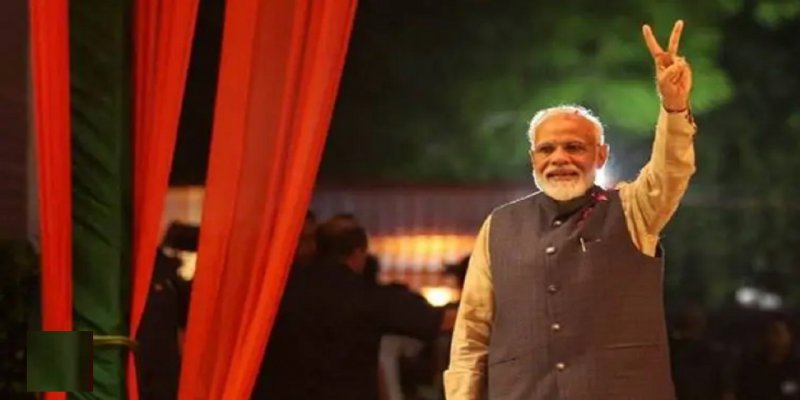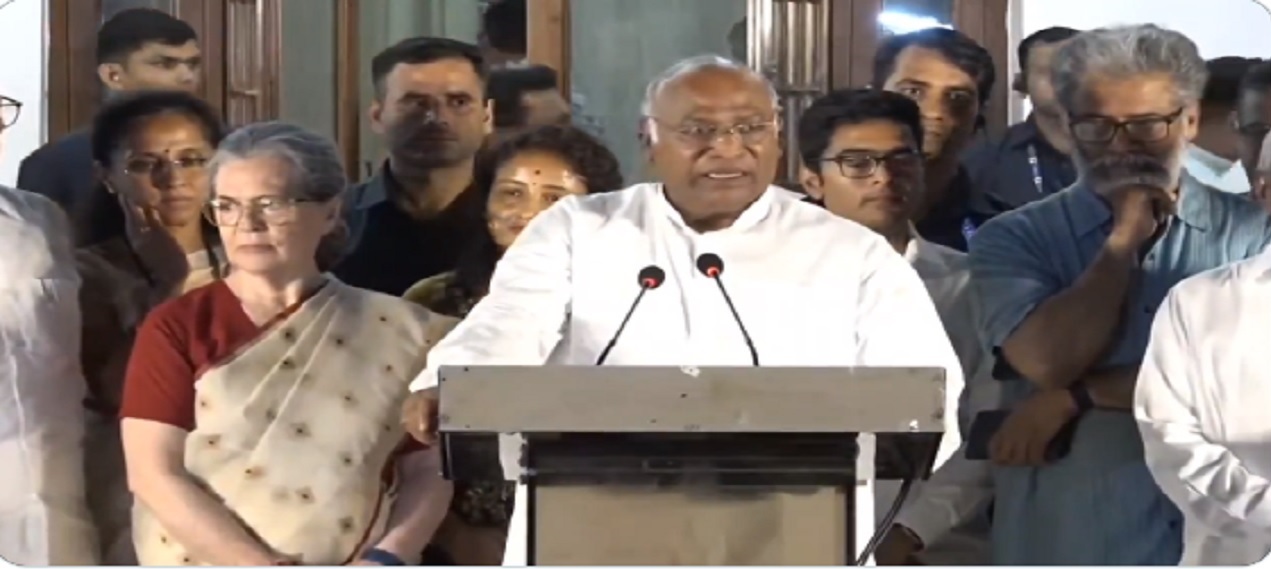`Remove `Modi ka Parivar` from social media handles`: PM Modi`s request to followers
- Saturday | 22nd June, 2024
Congress President Mallikarjun Kharge to attend PM-designate Modi`s swearing-in ceremony
- Thursday | 13th June, 2024

BY Alok Verma
In the recent elections, Prime Minister Narendra Modi`s failure to achieve the much-touted "abki baar 400 paar" (this time, over 400 seats) and secure a clear majority has sparked a myriad of analyses and debates. While some attribute this setback to Modi`s own missteps, a closer examination reveals a more intricate web of factors that contributed to this electoral outcome. This analysis delves into the multifaceted reasons behind Modi`s electoral performance, scrutinizing both his campaign strategies and the broader socio-political landscape.
Modi`s Campaign Strategy: A Double-Edged Sword
Prime Minister Modi`s campaign strategy has often been characterized by its aggressive and polarizing rhetoric. In the recent elections, Modi and his key ministers, such as Smriti Irani and Giriraj Singh, adopted a caustic and divisive narrative. This approach, while galvanizing a segment of the electorate, alienated a significant portion of the population. The use of street language and trivial issues like mangal sutra, inheritance, and buffalo theft diluted Modi`s stature as a global leader and detracted from the substantive achievements of his government.
The Missed Opportunity: Highlighting Developmental Achievements
One of the critical missteps in Modi`s campaign was the failure to foreground the BJP government`s formidable developmental work. Under Modi`s leadership, India witnessed significant advancements in infrastructure, healthcare, and education. The construction of world-class highways, ports, and airports, the establishment of premier institutions like AIIMS, IITs, and IIMs, and landmark decisions such as the abrogation of Article 370, the criminalization of triple talaq, and the promotion of digital money transfer were monumental achievements. Additionally, initiatives like healthcare insurance and food guarantee schemes had a tangible impact on the lives of millions.
However, instead of seeking a mandate based on these positive developments, Modi`s campaign veered towards sensationalism and trivial issues. This strategic miscalculation cost him dearly, as the electorate was more concerned with pressing issues like price rise, job stress, farmers` MSP, and the ease of doing small-scale business.
The Opposition`s Focus on Core Issues
In stark contrast to Modi`s campaign, opposition leaders like Priyanka Gandhi and Akhilesh Yadav remained focused on the core fundamental issues of people`s daily struggles and difficulties. Their campaigns were marked by a dignified tone and a focus on substantive issues, resonating with a broad spectrum of the electorate. By addressing concerns such as unemployment, inflation, and agrarian distress, the opposition managed to strike a chord with the voters.
The Erosion of Trust: Arrogant Governance & Rampant Corruption
Another significant factor contributing to Modi`s electoral setback was the perception of arrogant governance and rampant corruption. Despite his image as a decisive and strong leader, Modi`s administration was marred by allegations of corruption and cronyism. The electorate, who had high expectations from Modi, felt let down by the lack of transparency and accountability in his government. This erosion of trust was further compounded by the perception that Modi`s promises, often termed as "Modi ki guarantee," were not being fulfilled.
Public Sentiment & Governance Perception
Despite Narendra Modi`s popularity, there was a palpable sense of dissatisfaction among the electorate. Many Indians felt that the government had not adequately addressed fundamental issues such as inflation, unemployment, and the challenges faced by small businesses. The perception of `arrogant governance` and instances of rampant corruption further eroded public trust.
The promise of `Modi ki guarantee` was met with skepticism, as voters expected tangible improvements in their lives rather than assurances. This disconnect between government promises and public expectations played a significant role in the election results. The failure to secure a decisive mandate indicates a shift in voter sentiment, with a clear message that mere rhetoric cannot substitute for substantive action.
The Symbolic Defeat in Ayodhya
The defeat of the BJP`s candidate from the constituency of Ram temple in Ayodhya was a symbolic blow to Modi`s campaign. The construction of the Ram temple was a long-standing promise of the BJP and a significant part of its ideological agenda. However, even this monumental achievement could not garner enough votes to secure a landslide victory in Uttar Pradesh. This defeat underscored the electorate`s disillusionment with the BJP and their desire for a change in governance.
The Role of Economic Factors
Economic factors played a crucial role in shaping the electoral outcome. Despite the government`s efforts to project a narrative of economic growth and development, the reality on the ground was starkly different. The Indian economy was grappling with issues like unemployment, inflation, and agrarian distress. The government`s inability to address these issues effectively led to widespread discontent among the electorate.
The Impact of Social Policies
Modi`s social policies, while aimed at promoting inclusivity and social justice, also faced criticism. The abrogation of Article 370 and the criminalization of triple talaq were seen as bold moves, but they also sparked controversy and polarized public opinion. While these decisions were lauded by some, they were perceived as divisive and authoritarian by others. This polarization further eroded Modi`s support base.
The Influence of Media & Public Perception
The role of media and public perception cannot be underestimated in shaping electoral outcomes. Modi`s campaign, despite its aggressive rhetoric, was unable to effectively counter the narrative set by the opposition. The opposition`s focus on core issues and their dignified tone resonated with the electorate, while Modi`s campaign was seen as out of touch with the ground realities. The media`s portrayal of Modi`s campaign as divisive and sensationalist further compounded this perception.
The Changing Demographics & Voter Behavior
The changing demographics and evolving voter behavior also played a significant role in the electoral outcome. The electorate, particularly the youth, were more concerned with issues like employment, education, and economic opportunities. Modi`s failure to address these concerns effectively led to a shift in voter behavior. The electorate`s desire for a change in governance and their disillusionment with the BJP`s performance were reflected in the electoral outcome.
The Global Context and Modi`s Image
Modi`s image as a global leader, while a significant asset, also posed challenges. His frequent international visits and engagements were seen by some as neglecting domestic issues. The electorate`s perception that Modi was more focused on his global image than addressing pressing domestic concerns further eroded his support base. The global context, including economic uncertainties and geopolitical tensions, also influenced the electoral outcome.
Lessons for Modi & the BJP
The electoral setback offers several lessons for Modi and the BJP. Firstly, there is a need to recalibrate their campaign strategy and focus on substantive issues that resonate with the electorate. Highlighting the government`s developmental achievements and addressing pressing concerns like unemployment, inflation, and agrarian distress should be a priority.
Secondly, there is a need to rebuild trust and address the perception of arrogant governance and rampant corruption. Ensuring transparency, accountability, and good governance will be crucial in regaining the electorate`s trust.
Thirdly, there is a need to adopt a more inclusive and dignified tone in political discourse. Avoiding divisive and sensationalist rhetoric and focusing on constructive engagement with the electorate will be essential in rebuilding the BJP`s support base.

The Opposition`s Path Forward
For the Opposition, the election results are a validation of their strategy and approach. However, maintaining this momentum will require consistent efforts to address public concerns and present a viable alternative to the BJP. The opposition parties must continue to engage with the electorate on substantive issues, offering clear and practical solutions to the challenges faced by the country.
Strengthening grassroots connections, enhancing organizational capacity, and fostering unity among different opposition factions are crucial steps. The opposition must also capitalize on the discontent with the BJP`s governance to build a more robust and credible political front.
At last, The recent parliamentary election results reflect a complex interplay of factors, including campaign strategy, voter priorities, and governance perceptions. While Narendra Modi`s popularity remains significant, the BJP`s failure to secure a decisive mandate underscores the need for a more nuanced and issue-focused approach.
The electorate`s clear message is that development, economic stability, and good governance are paramount. Both the BJP and the opposition must heed this message to navigate the evolving political landscape of India. As the country moves forward, the focus must shift towards addressing the fundamental challenges faced by its citizens, fostering inclusive growth, and ensuring a stable and prosperous future for all.
(The writer is a National Seats winning journalist and Founder of www.nyoooz.com)

Your support to NYOOOZ will help us to continue create and publish news for and from smaller cities, which also need equal voice as much as citizens living in bigger cities have through mainstream media organizations.
